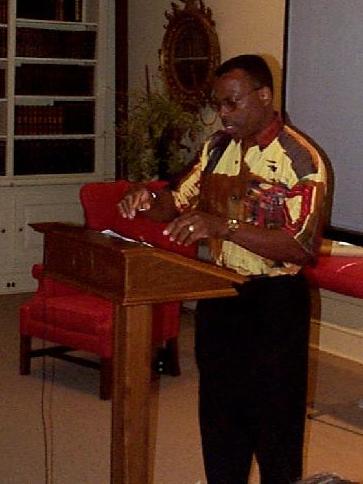


 |
 |
 |
On Monday night, Dr. Bernard Moitt was visiting the Cheek great room, and the seminarians there began to read aloud the assigned reading for his presentation on Tuesday. As they each took their turns reading, he gently corrected the mangling of the French verbiage they encountered.
Dr. Moitt was able to build on the sharing of the materials in the Cheek house the night before in his lecture on Tuesday. Because his area of study is the French slavery in the Caribbean, the texts that we were asked to read were difficult because of the French terms that had not daunted most seminarians since collegiate days.
 This same
language barrier has caused a delay in the important study of the French
Caribbean system of slavery. Dr. Moitt says to study racism in the
United States, study the Caribbean slave system since it is an earlier
system and it can shed light on its influence on the emergence of the system
here.
This same
language barrier has caused a delay in the important study of the French
Caribbean system of slavery. Dr. Moitt says to study racism in the
United States, study the Caribbean slave system since it is an earlier
system and it can shed light on its influence on the emergence of the system
here.
Dr. Bernard's research fills in important gaps in the system. The Caribbean system was brutal and harsh with slave masters free to act with impunity. One of Dr. Moitt's studies involves slave women and he documented the brutality of the system toward women. The diary of Thomas Thistlewood, a Jamaican slave owner who detailed his sexual assaults on female slaves, is representative of the capricious and brutal nature of the French slavery.
This brutality was not able to stamp out the African culture completely, and great remnants of the African culture remains. Voodoo, for example, comes from West African state, Dahomey. Obeh is also an African religion. Indicative of the spiritualism of the enslaved Africans.
The Haitian 1791 revolution that threw off the French Slave system was the only successful revolution in world history, but it is not recognized or studied as such. Nor has the legacy of that revolution produced a modern society that evinces the national growth such a freedom would be thought to engender. Other Caribbean societies tried to emulate this, but were unsuccessful.
Bernard hopes for more research and acknowledgment
of these efforts and individuals such as Jean Jacques Dessalines a general
who took over after Toussaint Louverture was betrayed by the French.
He thinks that the
history of mixture of races and large numbers of blacks contribute to what
he sees as a more tolerant racial relationship among Caribbean races than
in the United States. The problem in the U.S. is racism. It
does not exist in the same way as it does in the United States.
Here we have to live with the day to day basis that does not exist
in the Caribbean.